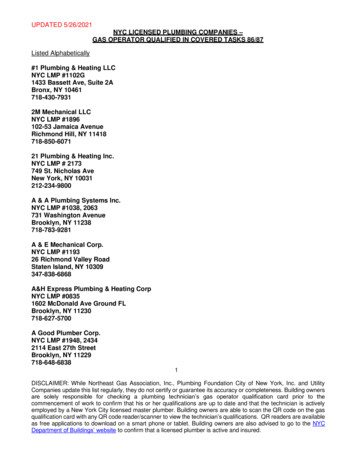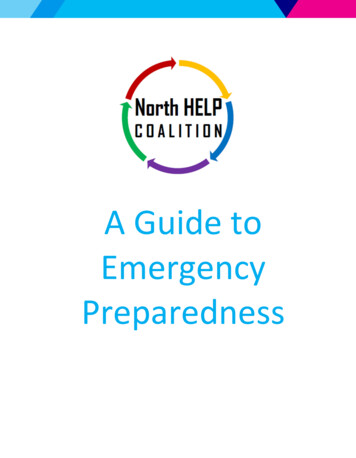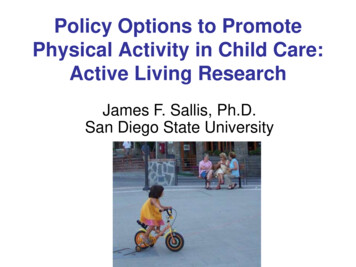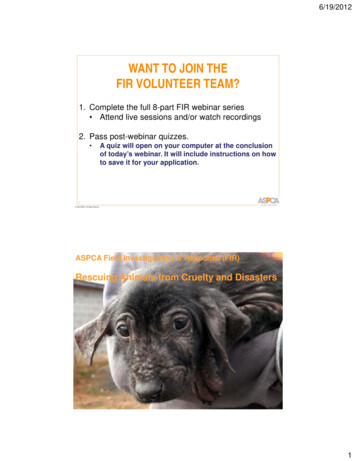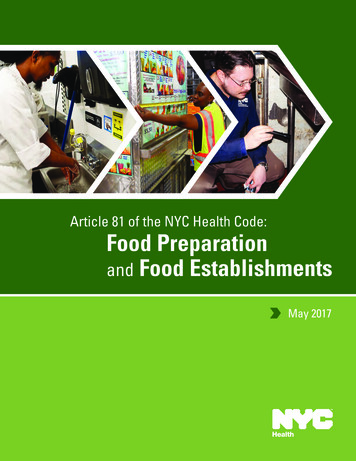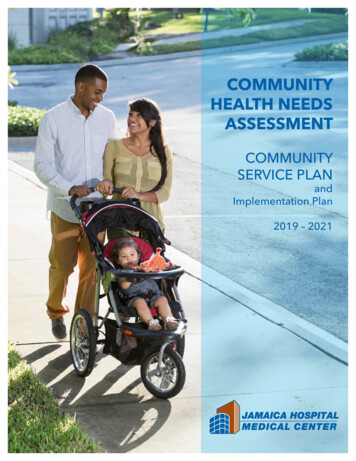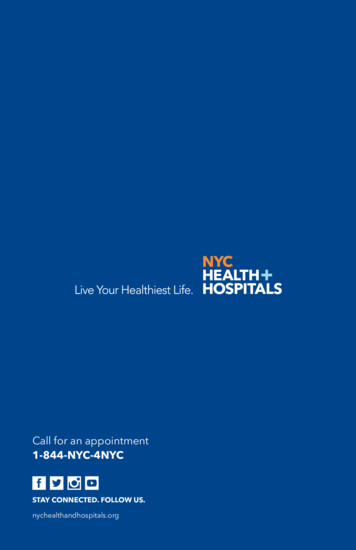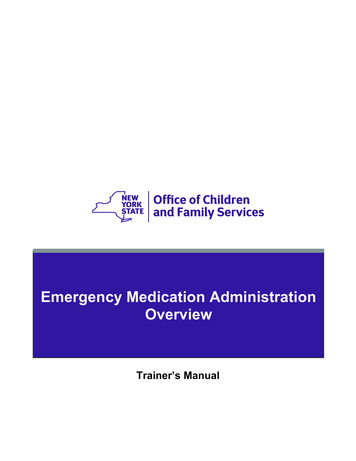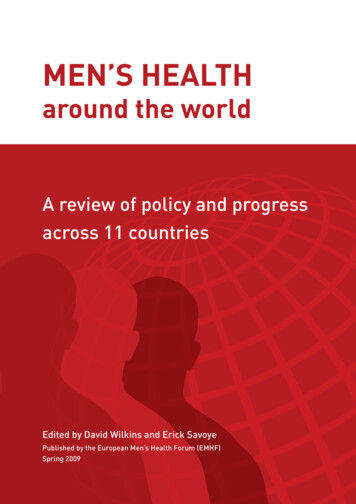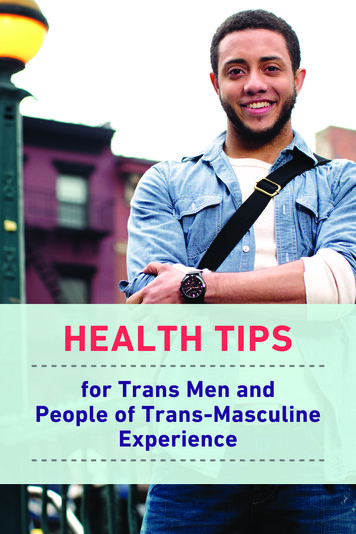
Transcription
HEALTH TIPSfor Trans Men andPeople of Trans-MasculineExperience
GET MEDICAL CARERegularly ind a health care provider you trust.FSee the inside of the back cover to find clinics withexperience working with trans-masculine people.Help your provider know how to make yourvisit better. It is your provider’s responsibilityto make your experience affirming, respectfuland comfortable. Share the name and pronounsyou want your provider to use.Get medical care that is right for you. Ask yourhealth care provider which routine screenings youneed. These may include screenings for high bloodpressure, high cholesterol, diabetes, HIV and othersexually transmitted infections (STIs). You may also need cancer screenings appropriateto your body — these may include Pap smearsand chest screenings.1
Know Your Rights In New York State, health insurance, including Medicaid,must cover transgender care recommended by yourprovider, including surgeries and hormone therapy. I n New York City, it is illegal to deny anyone employment orhousing, education, health care or other services based ongender identity or expression. T o change your gender on a New York City birth certificate,call 311 or visit nyc.gov and search “Change Birth Certificate.”If you were born in New York City, surgery is not required tochange your gender marker.2
STAY SAFEDuring Transition There is no one way to transition. Everyone’s experienceis different. You may decide to take steps to change your body, and/ortransition socially. Transition at your own pace.B e open with your provider, so you get the care you need. Tell your provider if you take hormones, or if you’d liketo start. Let your provider know if you’ve had surgery. If you areconsidering surgery, see the inside of the back coverfor resources or consult with your provider to find theright surgeon. on’t bind your chest too tightly.D Binding with too many layers, or for more than 12 hoursat a time, can cause problems. Binders made specifically for trans men are safer andmore comfortable than ACE bandages or duct tape, whichcan hurt you.3
Hormone Safety Tips If you decide to takehormones, use hormonesprescribed by a provider.Your provider can makesure you’re getting the righthormones at the right doses. K now your options. Someoptions, such as gels,patches or pellets, may havefewer side effects. Be patient with hormones.Change won’t happenovernight. Taking extratestosterone (or “T”) candamage your liver. Extratestosterone also convertsto estrogen and may slowyour transition. If you do inject hormones,use a clean needle EVERYTIME. Sharing syringes orvials of hormones risksexposure to hepatitis B,hepatitis C and HIV. Ask yourhealth care provider to showyou how to inject safely.4
TAKE CARE OF YOURSexual Health Make sexual health a part of your life. Enjoy your sex lifewhile taking steps to reduce the chance of HIV and STIs. Ask your provider about vaccines that can protect you. TheHPV vaccine prevents cervical and anal cancer. Other vaccinescan protect you from hepatitis A, hepatitis B and meningitis. Talk about sex with your partner(s). Discuss what you like anddon’t like, and how to keep sex safer. Protect yourself and your partners. HIV and other STIs caneasily pass to the penetrated partner, especially during analsex. Use condoms for anal or front sex, latex gloves whenfingering or fisting, and latex condoms or dental dams duringoral sex. If you have a latex allergy, ask your pharmacist orprovider about latex-free alternatives. Use water-based or silicone lubricant to reduce the risk ofbleeding or breaking a condom during sex. Keep in mind thatsilicone lube will damage silicone toys. Taking testosteronecan make the front hole dryer, so use extra lube or ask yourprovider about a low-dose estrogen cream. Keep in mind that testosterone does not prevent pregnancy.Talk to your provider about safe and effective ways to prevent,or plan for, pregnancy. If you use a packer, or a stand-to-pee (STP) device, keep itclean by washing with soap and water. Use cornstarch, instead ofpowders that contain talc, to prevent it from sticking to your skinor gathering dirt.5
Protect Yourself From HIVand Other STIs Get tested regularly for HIV and other STIs. You may havean STI, even if you don’t have any symptoms. If you are concerned about exposure to HIV, talk to yourprovider about PrEP and PEP.PrEP (pre-exposure prophylaxis) is a daily pill thatcan protect you against HIV.PEP (post-exposure prophylaxis) is an emergencymedicine that can stop HIV if started right after apossible exposure. If you have HIV, get treatment. The sooner you begintreatment, the less HIV will damage your body. And if youtake your HIV medications every day, you are much lesslikely to pass HIV to your partners.PLAY SURE6
TAKE CAREof Your Mind, Spirit and BodyTake Care of Your Emotional Health Trans people can struggle with having a body that is differentthan the body they want. Support groups, online forums orcounseling can help. I f you feel stressed or depressed, reach out to friends, family,support groups or your provider for help.Take Care of Your Body S tay physically active and get enough sleep. Eat regular,healthy meals. B e careful with alcohol and drugs. Drinking and drug use canput you at risk for many health problems. S moking can damage your heart and lungs, and can interferewith your transition. If you smoke, call 311 for free support tohelp you quit.Have Healthy Relationships G et help if you’re in an abusive relationship. A busive partners can be of any gender, and abuse can takemany forms — it can be physical, sexual or emotional, andcan involve threats or insults.7
Resources For trans support groups, call Destination Tomorrow(347.291.1732), CK Life (917.979.3255), SHINE Project(718.883.8642), LGBT Community Center (212.620.7310)or Brooklyn Community Pride Center (347.889.7719). For support for partners of trans persons, call the LGBTCommunity Center Gender Identity Project (646.556.9300)or the SHINE Project at Community Healthcare Network(646.276.3383). F or help with depression or alcohol and drug problems,call 311 or the LGBT Community Center Gender IdentityProject (646.556.9300). If partner abuse or hate violence is a problem, call 911in an emergency, or call the 24-hour hotline of theNew York City Anti-Violence Project (212.714.1141). F or help in a crisis, call Trans Lifeline (877.565.8860), theNational Suicide Prevention Lifeline (800.273.8255) or theGay, Lesbian, Bisexual and Transgender National Hotline(888.843.4564); youth up to 24 years old can call the TrevorProject (866.488.7386).8
More ResourcesTransgender-Friendly Medical Providers A PICHA Community Health CenterManhattan: 212.334.6029 www.apicha.org C allen-Lorde Community Health Center(with separate clinic for youth 13 to 24)Manhattan: 212.271.7200 www.callen-lorde.org C hildren’s Hospital at MontefioreLGBTQ Youth and Families Program (for youth 13 to 21)Bronx: 718.882.0023, ext. 211 www.cham.org C K Life-Bronx Transgender Health Space(Bronx-Lebanon Hospital Center)Bronx: 917.979.3255 www.blhfamilymed.com Community Healthcare NetworkQueens: 718.883.8635 Bronx: 718.320.6765Manhattan: 646.276.3383 www.chnnyc.org H EAT: Health Education & Alternatives for Teens(for youth 13 to 24)Brooklyn: 718.467.4446 www.heatprogram.org H ousing WorksBrooklyn: 718.277.0386 Manhattan: 212.677.7999www.housingworks.org Metropolitan Hospital Comprehensive LGBT Health CenterManhattan: 212.423.7292 nyc.gov/hhc M ount Sinai Beth Israel, LGBT Family HealthManhattan: 212.604.1800 www.bethisraelny.org M ount Sinai Beth Israel, Peter Krueger ClinicManhattan: 212.420.2620 www.bethisraelny.org P ersist Health Project (health referrals for sex workers)718.635.1791 www.persisthealthproject.org9
Other Resources F or free or low-cost health insurance,call 311 for an enrollment location near you. F or referrals to health care providers,call Destination Tomorrow (347.291.1732). F or more information about HIV and STIs, including whereto get free, confidential testing, or PrEP or PEP to preventHIV, call 311 or visit nyc.gov and search “HIV.” T o find out where to get free condoms,call 311 or visit nyc.gov/condoms. For assistance with HIV care, treatment and housing,call 311 or text* CARE to 877877. F or drop-in spaces and emergency housing for youth up to24 years old, call the Streetwork Project (800.708.6600), AliForney Center (212.206.0574) or The Door (212.941.9090). F or trans-friendly school and after-school programs,call the Hetrick-Martin Institute (212.674.2400). F or legal help, including help changing your name, call theSylvia Rivera Law Project (212.337.8550), the TransgenderLegal Defense and Education Fund (646.862.9396),Immigration Equality (212.714.2904), Urban Justice Center(646.602.5600), Lambda Legal (212.809.8585) or the NewYork Legal Assistance Group (212.613.5000). I f you have questions about transitioning,visit www.transbucket.com.* Message and data rates may apply. Text STOP to quit, HELP for moreinformation. For terms of Use and Privacy Policy, visit nyc.gov/health.10
CALL 311 TO ORDER COPIES OF THIS PAMPHLET.Visit nyc.gov and search “Transgender Health” for up-to-dateinformation on trans-friendly medical services, support servicesand support groups in New York City.
to get free, confidential testing, or PrEP or PEP to prevent HIV, call 311 or visit nyc.gov and search "HIV." To find out where to get free condoms, call 311 or visit nyc.gov/condoms. For assistance with HIV care, treatment and housing, call 311 or text* CARE to 877877. For drop-in spaces and emergency housing for youth up to
